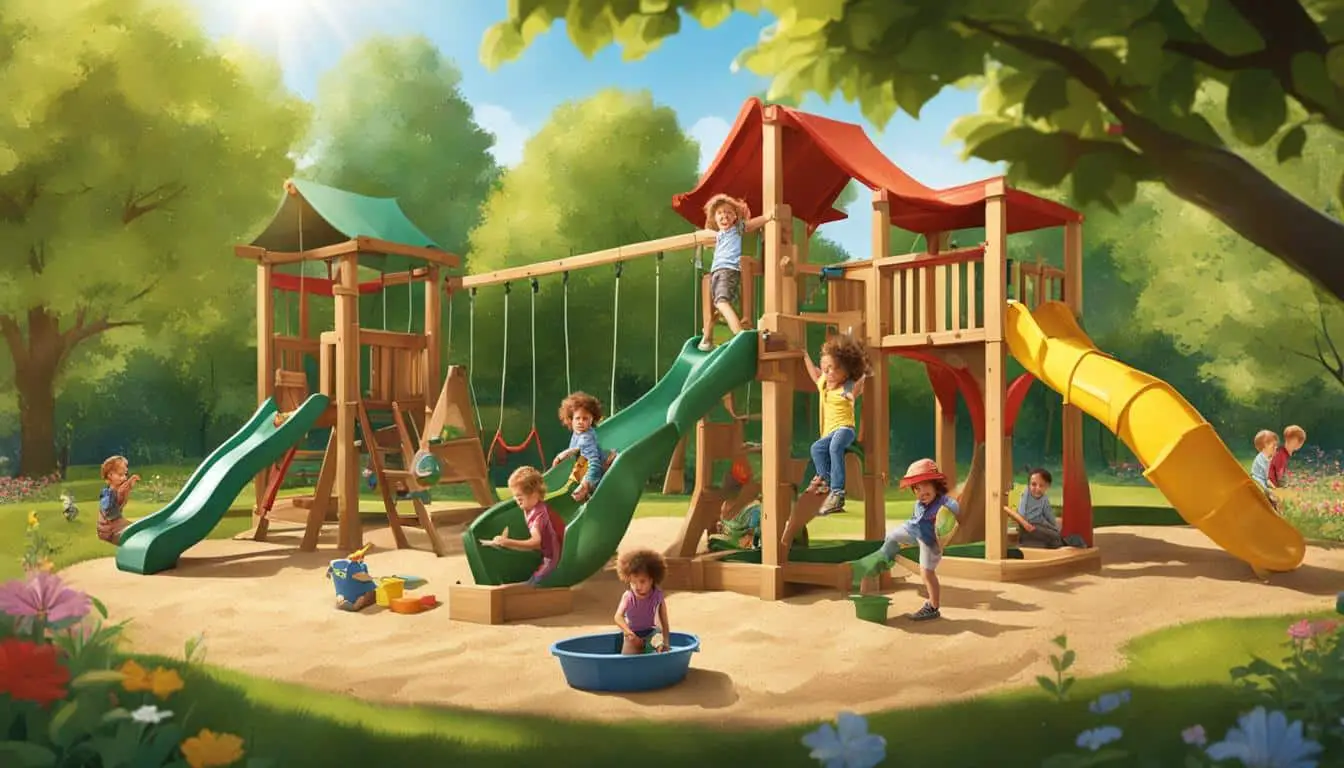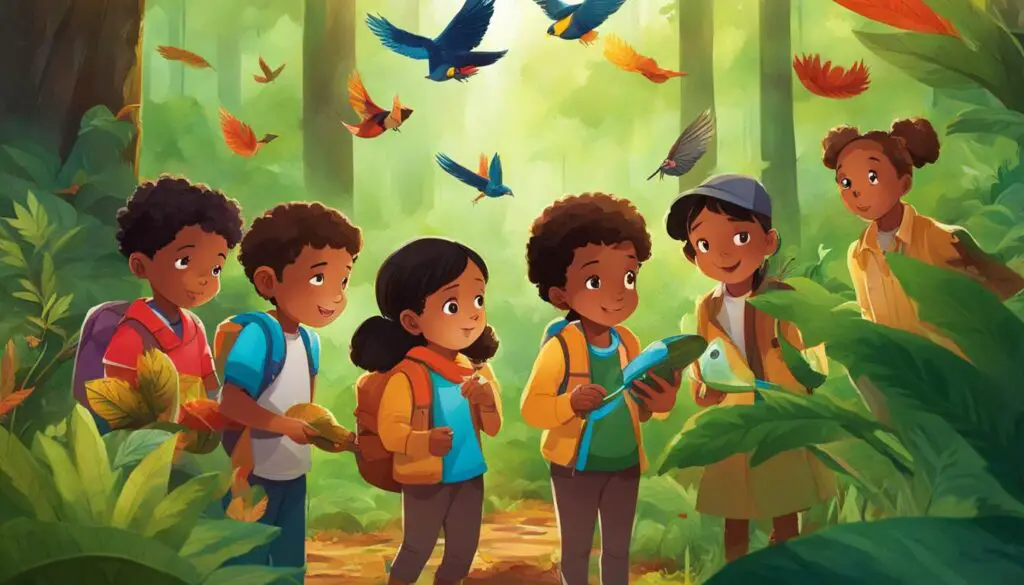
The Benefits of Outdoor Play for Children’s Development
As a professional copywriting journalist, I have researched and written about numerous topics relating to child development. In this article, I want to draw attention to the benefits of outdoor play for children’s overall growth and development.
Outdoor play refers to any physical activity that takes place in an outdoor setting, such as a park, backyard, or playground. Research shows that outdoor play contributes significantly to children’s physical health, cognitive development, emotional well-being, social skills, and environmental awareness.
As an advocate for child development, I urge parents, caregivers, and educators to encourage children to explore and play outdoors. By doing so, children can reap the many benefits that outdoor play has to offer.
Key Takeaways:
- Outdoor play promotes physical health, cognitive development, emotional well-being, social skills, and environmental awareness in children.
- Children who engage in outdoor play can build strength, endurance, coordination, problem-solving, critical thinking, creativity, self-confidence, empathy, and resilience.
- Outdoor play reduces stress and anxiety levels, improves attention span, memory, and overall cognitive function in children.
- Engaging in outdoor play provides ample opportunities for socialization, cooperation, communication, and conflict resolution skills in children.
- Exploring nature and understanding ecosystems fosters a love for the environment in children who engage in outdoor play.
Physical Health Benefits of Outdoor Play
When children engage in outdoor play, they get a chance to flex and exercise their bodies. Activities like running, climbing, and playing games outdoors stimulate growth in strength, coordination, and endurance. Furthermore, outdoor play encourages gross motor skill development, reduces the risk of obesity, and improves cardiovascular health.
Research shows that it’s important for children to engage in at least 60 minutes of physical exercise per day.
Playing outside allows children to experience physical challenges that cannot be replicated indoors. The natural environment creates new obstacles for children to overcome, such as uneven terrain, climbing trees, and running on different surfaces. These obstacles help them to develop greater coordination and balance, allowing them to move around with more ease. With this increased mobility, their overall health is benefited by the cardiovascular exercise they receive.
The Negative Impact of Sedentary Activities
In today’s world, many children prefer to be indoors playing video games or using computers. While the occasional indoor activity is not detrimental to a child’s health, excessive sedentary behavior can have a negative impact.
A research study published in the Journal of Sports Medicine recommends that sedentary time should be limited to two hours per day and replaced with physical activity.
Encouraging outdoor play instead of sedentary indoor activities can be an excellent way to give children the necessary physical activity they need while allowing them to enjoy a fun and active environment.
Cognitive Benefits of Outdoor Play
When it comes to cognitive development, outdoor play offers a range of benefits for children. Spending time outdoors provides opportunities for exploration and discovery, enabling children to learn about the natural world and develop their problem-solving and critical thinking skills. Outdoor play also promotes creativity and imagination, particularly when it comes to nature-based play, which can involve building forts or creating art with natural materials.
In addition, exposure to natural environments has been shown to enhance attention span and memory capabilities. Studies have found a positive correlation between proximity to green spaces and cognitive function, with children who have access to green areas performing better on cognitive tasks than those who don’t. As such, encouraging children to spend more time outdoors can have a significant impact on their cognitive development and overall academic success.

“By offering stimulating environments, natural play spaces can encourage cognitive, creative, and social development”.
Emotional Benefits of Outdoor Play
Outdoor play is not only essential for children’s physical development but also has a positive impact on their emotional well-being. Spending time in nature can reduce stress and anxiety levels, promoting a sense of calmness and relaxation.
Moreover, outdoor play provides children with a sense of freedom and independence, allowing them to explore their surroundings and gain confidence in their abilities. Nature-based play activities increase self-esteem and foster emotional regulation, encouraging children to manage their emotions and become more resilient.
Outdoor play also fosters social interaction and collaboration with peers or siblings, which promotes empathy, self-awareness, and emotional intelligence. Children learn to work in a team, respect each other’s opinions, and resolve conflicts peacefully, leading to improved self-esteem and positive interpersonal relationships.

I have seen the significant emotional benefits of outdoor play in my own children. They become more relaxed, cooperative, and self-sufficient when they are allowed to explore and play in nature.
Overall, outdoor play provides numerous emotional benefits for children, allowing them to feel more connected to nature, develop independent thinking, self-regulation, and emotional intelligence, while building positive relationships with their peers and caregivers.
Social Benefits of Outdoor Play
Outdoor play provides numerous social benefits for children. Through play, children can develop essential social skills that are crucial to success in their future relationships and career.
Firstly, outdoor play offers children ample opportunities to interact with their peers, siblings, or other children in the community, fostering socialization, cooperation, communication, and conflict resolution skills. Research indicates that children who participate in outdoor play are more likely to initiate interactions with their peers, show empathy and display higher levels of social competence.
Secondly, outdoor play enables children to develop friendships, build social connections, and learn how to navigate social situations. By playing together and engaging in fun activities, children can bond, share their ideas and discover common interests. These experiences help children to build a sense of belonging and connectedness, which is a crucial component of positive mental health.
‘Play is one of the most natural and effective ways to promote socialization skills,” says Dr. Sheri Madigan, assistant professor at the University of Calgary. ‘Exposure to socializing experiences, such as play, can provide children with the necessary skills to navigate the complex social world and set the foundation for positive relationships.’
Lastly, outdoor play provides children with an opportunity to engage in positive, fun-filled activities with other children regardless of their race or ethnicity. Children get exposed to multiculturalism and understand that people have differences and similarities that can enrich one another’s lives.
Summary of Social Benefits of Outdoor Play
| Benefit of Outdoor Play | Description |
|---|---|
| Promotes Socialization | Outdoor play provides ample opportunities for children to interact with their peers, fostering socialization, cooperation, communication, and conflict resolution skills. |
| Enables Friendships and Social Connections | Outdoor play enables children to develop friendships, build social connections, and navigate social situations. |
| Encourages Multiculturalism | Outdoor play provides children with an opportunity to engage in positive, fun-filled activities with other children regardless of their race or ethnicity. |
Environmental Awareness and Appreciation
Outdoor play is an excellent way to instill environmental awareness in children. Spending time in nature helps them understand the importance of preserving the environment. They get to explore and appreciate the beauty and diversity of nature, observe plants and animals, and learn how ecosystems work.
Children who engage in outdoor play have a greater sense of connection with nature and are more likely to develop a desire to conserve the environment as they grow older. This love and appreciation for the environment will stay with them throughout their lives and inspire them to take action to protect our planet.
As a child, I remember spending long hours playing outdoors with my friends, climbing trees, and exploring forests. These experiences made me realize how much I loved nature and how important it is to protect and care for it. With outdoor play, children get to develop a sense of respect and reverence for the environment, which has a lasting impact on their lives.
“In every walk with nature, one receives far more than he seeks.” – John Muir
Conclusion
After exploring the numerous benefits of outdoor play for children’s development, it is clear that spending time outdoors is crucial for their growth and well-being. Not only does it promote physical health, such as building strength, endurance, and coordination, but it also stimulates cognitive development, enhances emotional well-being, and fosters social skills.
Encouraging children to engage in unstructured outdoor play, exploration, and nature-based activities can have a long-lasting positive impact on their development and future. They learn valuable skills, such as problem-solving, critical thinking, and creativity, while building their self-esteem, emotional intelligence, and independence.
In conclusion, outdoor play is a fundamental aspect of children’s development. It helps them to become well-rounded individuals with a love for the environment and a desire to protect and preserve it for future generations. As a professional copywriting journalist, it is my sincere hope that this article has shed light on the importance of outdoor play for children’s development, and I encourage parents and caregivers to incorporate it into their daily routines.
So, let’s allow our children to get outside, breathe the fresh air, and enjoy the immense benefits that outdoor play has to offer for their development.
Thank you for reading.
FAQ
What are the benefits of outdoor play for children’s development?
Outdoor play offers numerous benefits for children’s development, including physical health, cognitive skills, emotional well-being, and social interaction. It promotes exercise, builds strength and coordination, fosters creativity and problem-solving skills, reduces stress, improves social skills, and develops a sense of environmental awareness and appreciation.
How does outdoor play contribute to children’s physical health?
Engaging in outdoor play allows children to be active, exercise their bodies, and develop physical strength, endurance, and coordination. It also helps to build gross motor skills, reduces the risk of obesity, and improves cardiovascular health.
What are the cognitive benefits of outdoor play?
Outdoor play stimulates children’s cognitive development by providing opportunities for exploration, problem-solving, and critical thinking. It encourages creativity, imagination, and independent play. Exposure to natural environments enhances attention span, memory, and overall cognitive function.
How does outdoor play impact children’s emotional well-being?
Outdoor play has a positive impact on children’s emotional well-being by reducing stress and anxiety levels, promoting a sense of calmness and relaxation. It also fosters self-confidence, independence, social interaction, empathy, and resilience, leading to improved emotional intelligence and self-esteem.
What social benefits does outdoor play offer?
Engaging in outdoor play provides opportunities for children to interact with their peers, siblings, or other children in the community, promoting socialization, cooperation, communication, and conflict resolution skills. It helps children develop friendships, build social connections, and navigate social situations.
How does outdoor play promote environmental awareness?
Outdoor play encourages children to connect with the natural world, observe plants and animals, and understand ecosystems. This fosters a love for the environment and develops a sense of environmental awareness and appreciation. Children who engage in outdoor play are more likely to become environmentally conscious and have a desire to protect and preserve nature.